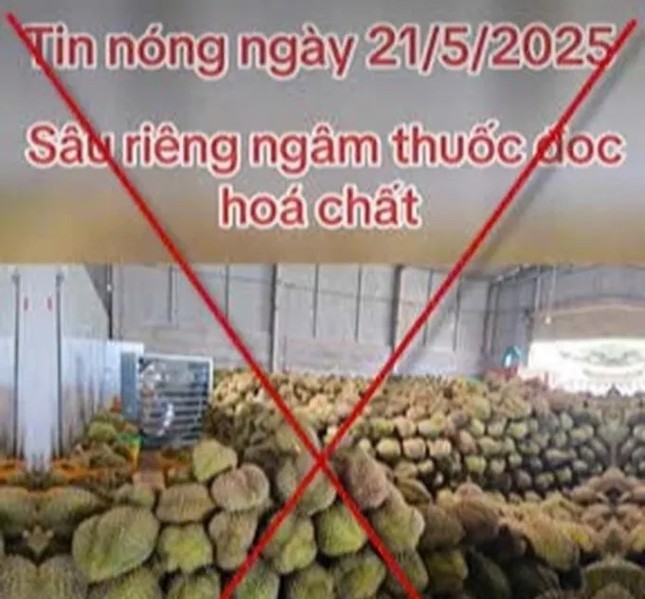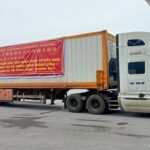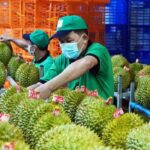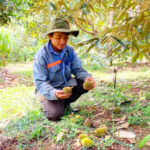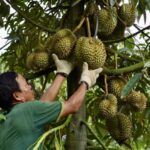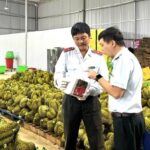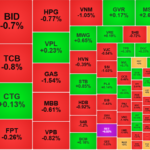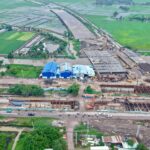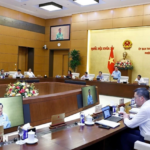Fake News Causing Public Alarm
In late May, a series of videos and images circulated rapidly on social media, depicting workers “dipping durians in chemical tanks” with sensational headlines such as “Durians from Dak Nong soaked in toxic chemicals before hitting the market.” These clips quickly went viral on TikTok and Facebook, generating hundreds of thousands of interactions and causing concern among consumers.
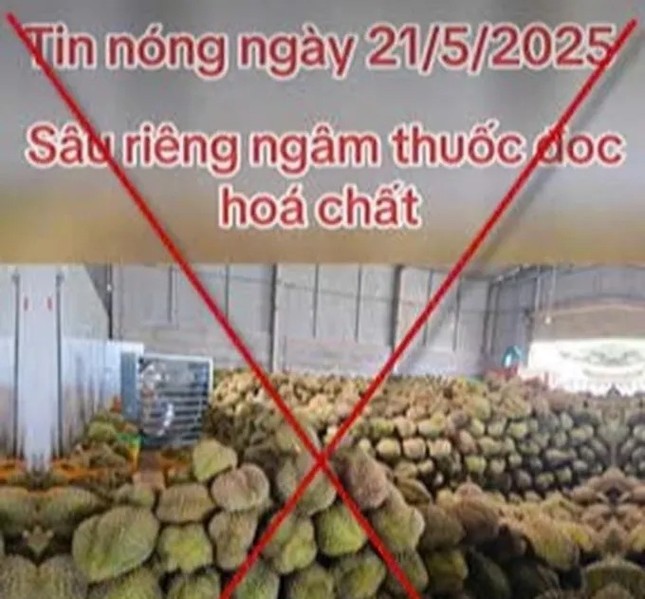
Misleading information about durians from Dak Nong on social media. Screenshot from the video.
The Department of Agriculture and Environment of Dak Nong province issued a statement clarifying that all the images and videos causing a stir online stemmed from a violation that occurred back in late 2017. A company in Gia Nghia city was found using chemicals of unknown origin in durian processing and was penalized, their operations halted, and their products destroyed. Since then, there have been no recurrent incidents. The company in question has overhauled its production processes and obtained international food safety certifications such as HACCP and ISO 22000:2018, with regular audits conducted by independent organizations.
The Dak Nong Department of Agriculture and Environment emphasized that disseminating old images with new, false captions severely damages the reputation of Vietnamese agricultural produce, especially durians, which are making significant strides in the international market.
The department also urged the public to refrain from sharing, commenting on, or interacting with unverified content. Instead, they encouraged people to prioritize information from official sources to help stabilize the market and protect the reputation of Vietnamese agricultural products.
Lawyer Nguyen Van Hau, Vice Chairman of the Ho Chi Minh City Bar Association, stated that posting and spreading false information on social media, especially content that hasn’t been verified, can incur administrative or criminal penalties depending on the severity of the offense.
Specifically, according to Clause 101 of Decree No. 15/2020/ND-CP of the Government (amended by Decree 14/2022/ND-CP), individuals or organizations providing or sharing fake or false information, defaming individuals or organizations on the network, may be administratively fined from VND 10-20 million for organizations and from VND 5-10 million for individuals. They will also be forced to remove the offending content.
If the act of spreading misinformation has serious consequences, is of a slanderous nature, incites public disorder, or significantly affects the reputation of individuals or organizations, the violator may be subject to criminal liability.
A Strategic Industry’s Key to Development
Durians are currently one of the most promising agricultural export products, not only for the Chinese market but also for demanding markets such as South Korea, Japan, and Europe.
According to the Vietnam Fruit and Vegetable Association, the Vietnamese durian industry is going through a particularly “sensitive” period. While regaining its foothold in the Chinese market, it also faces intense competition from other Southeast Asian countries. Therefore, any misleading information can shake market confidence and severely impact the entire value chain, from farmers to businesses and exporters.
Instead of being alarmed by baseless rumors, we should acknowledge the efforts of farmers, businesses, and authorities in ensuring product quality and safety.
The government has been actively providing specific directives to support and address challenges faced by the durian industry. Notably, on May 31, Prime Minister Pham Minh Chinh signed Dispatch No. 79/CD-TTg, instructing ministries and sectors to proactively implement measures to ensure the production, processing, and consumption of agricultural products, including durians. Earlier, on May 23, Deputy Prime Minister Tran Hong Ha also signed Dispatch No. 71/CD-TTg on promoting the sustainable export of durians.
Additionally, on May 28, the Customs Department directed its subordinate units to prioritize customs clearance for agricultural products, especially durians, which are currently in the peak harvest season and highly perishable. From May 27 to 29, a working group from the Ministry of Agriculture and Environment also had direct working sessions with the General Administration of Customs of China to open a “green channel” for priority customs clearance for Vietnamese durians.

Minister Do Duc Duy (second from left) discussing with durian farmers in Dak Lak. Photo: N.N.
These swift and coordinated actions demonstrate the recognition of durians as a strategic industry, with the aim of developing it into a national brand with a distinct position in the global agricultural export landscape. However, for durians to successfully “ride the wave,” it is essential to maintain and strengthen the trust of the domestic market.
“Currently, durians from Dak Nong are considered one of the key products of the locality, not only in terms of output but also in quality,” affirmed a representative of the Vietnam Fruit and Vegetable Association. “Vietnamese durians are undergoing rigorous measures by the authorities regarding traceability, pesticide residue control, processing procedures, and transportation conditions. Therefore, consumers should have faith in this strong industry of ours and refrain from believing baseless rumors that could tarnish its reputation,” they added.
“Vietnamese Frozen Durian Exports to China: A Swift and Successful Negotiation”
“Just two days after the meeting between the Vietnamese Ministry of Agriculture and Environment and the General Administration of Customs of China, Vietnam exported its first batch of frozen durians to China. This marks a significant step forward in the trade cooperation of agricultural products between the two nations.”
The King of Fruits Faces an Uncertain Future: Unripe Durian Trees in Gia Lai Province Suffer a Devastating Blow.
In the face of extreme weather conditions, farmers in Gia Lai province witnessed a devastating sight as their young durians, no bigger than a fist, started falling off the trees en masse. This unexpected turn of events has left farmers in this mountainous region grappling with the stark reality of potential crop failure and significant financial losses.
“Unveiling the Truth: Independent Testing of Chemicals in Lam Dong’s Durian”
On May 24, the Department of Agriculture and Environment of Lam Dong province announced that no traces of yellow dye, a chemical previously warned against for illegal usage to artificially color fruits, were found in hundreds of tested durian samples across the region.


























